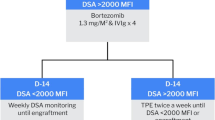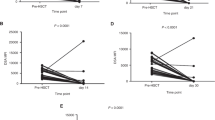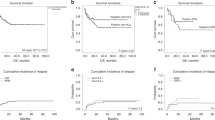Abstract
A role of donor-specific HLA antibodies (DSA) in graft failure after SCT has been suggested, but the relevance of DSA in unmanipulated haploidentical SCT (haplo-SCT) remains unknown. We prospectively examined HLA antibodies using the Luminex-based single Ag assay for 79 adult patients undergoing unmanipulated haplo-SCT. Among them, 16 (20.2%) were HLA Ab-positive, including five patients with antibodies not corresponding to donor HLA Ags and 11 DSA-positive patients. Of the 11 DSA-positive patients, five received treatments to decrease DSA levels, including two, who received plasma exchange and rituximab, two who received platelet transfusions from healthy-related donors having DSA-corresponding HLA Ags and one who received bortezomib. Platelet transfusion was the most simple and effective treatment option for class I DSA. The cumulative incidence of neutrophil recovery was significantly lower in pretransplant (post-treatment) DSA-positive patients than in DSA-negative patients (61.9 vs 94.4%, P=0.026). Notably, three of five patients with high levels of DSA had graft failure. Donors should be selected on the basis of an evaluation of HLA antibodies. If haplo-SCT from donors with HLA Ags that correspond to high levels of DSA must be performed, then recipients should be treated for DSA to improve the chances of successful donor engraftment.
This is a preview of subscription content, access via your institution
Access options
Subscribe to this journal
Receive 12 print issues and online access
$259.00 per year
only $21.58 per issue
Buy this article
- Purchase on Springer Link
- Instant access to full article PDF
Prices may be subject to local taxes which are calculated during checkout


Similar content being viewed by others
References
Anasetti C, Amos D, Beatty PG, Appelbaum FR, Bensinger W, Buckner CD et al. Effect of HLA compatibility on engraftment of bone marrow transplants in patients with leukemia or lymphoma. N Engl J Med 1989; 320: 197–204.
Ottinger HD, Rebmann V, Pfeiffer KA, Beelen DW, Kremens B, Runde V et al. Positive serum crossmatch as predictor for graft failure in HLA-mismatched allogeneic blood stem cell transplantation. Transplantation 2002; 73: 1280–1285.
Kernan NA, Flomenberg N, Dupont B, O’Reilly RJ . Graft rejection in recipients of T-cell-depleted HLA-nonidentical marrow transplants for leukemia. Identification of host-derived antidonor allocytotoxic T lymphocytes. Transplantation 1987; 43: 842–847.
Fleischhauer K, Zino E, Mazzi B, Sironi E, Servida P, Zappone E et al. Peripheral blood stem cell allograft rejection mediated by CD4(+) T lymphocytes recognizing a single mismatch at HLA-DP beta 1*0901. Blood 2001; 98: 1122–1126.
Taylor PA, Ehrhardt MJ, Roforth MM, Swedin JM, Panoskaltsis-Mortari A, Serody JS et al. Preformed antibody, not primed T cells, is the initial and major barrier to bone marrow engraftment in allosensitized recipients. Blood 2007; 109: 1307–1315.
Terasaki PI, Cai J . Human leukocyte antigen antibodies and chronic rejection: from association to causation. Transplantation 2008; 86: 377–383.
Muro M, Marin L, Miras M, Moya-Quiles R, Minguela A, Sanchez-Bueno F et al. Liver recipients harbouring anti-donor preformed lymphocytotoxic antibodies exhibit a poor allograft survival at the first year after transplantation: experience of one centre. Transpl Immunol 2005; 14: 91–97.
Tambur AR, Bray RA, Takemoto SK, Mancini M, Costanzo MR, Kobashigawa JA et al. Flow cytometric detection of HLA-specific antibodies as a predictor of heart allograft rejection. Transplantation 2000; 70: 1055–1059.
Girnita AL, Duquesnoy R, Yousem SA, Iacono AT, Corcoran TE, Buzoianu M et al. HLA-specific antibodies are risk factors for lymphocytic bronchiolitis and chronic lung allograft dysfunction. Am J Transplant 2005; 5: 131–138.
Zachary AA, Leffell MS . Detecting and monitoring human leukocyte antigen-specific antibodies. Hum Immunol 2008; 69: 591–604.
Lefaucheur C, Loupy A, Hill GS, Andrade J, Nochy D, Antoine C et al. Preexisting donor-specific HLA antibodies predict outcome in kidney transplantation. J Am Soc Nephrol 2010; 21: 1398–1406.
Costa LJ, Moussa O, Bray RA, Stuart RK . Overcoming HLA-DPB1 donor specific antibody-mediated haematopoietic graft failure. Br J Haematol 2010; 151: 94–96.
Spellman S, Bray R, Rosen-Bronson S, Haagenson M, Klein J, Flesch S et al. The detection of donor-directed, HLA-specific alloantibodies in recipients of unrelated hematopoietic cell transplantation is predictive of graft failure. Blood 2010; 115: 2704–2708.
Ogawa H, Ikegame K, Yoshihara S, Kawakami M, Fujioka T, Masuda T et al. Unmanipulated HLA 2-3 antigen-mismatched (haploidentical) stem cell transplantation using nonmyeloablative conditioning. Biol Blood Marrow Transplant 2006; 12: 1073–1084.
Ogawa H, Ikegame K, Kaida K, Yoshihara S, Fujioka T, Taniguchi Y et al. Unmanipulated HLA 2-3 antigen-mismatched (haploidentical) bone marrow transplantation using only pharmacological GVHD prophylaxis. Exp Hematol 2008; 36: 1–8.
Tamaki H, Ikegame K, Kawakami M, Fujioka T, Tsuboi A, Oji Y et al. Successful engraftment of HLA-haploidentical related transplants using nonmyeloablative conditioning with fludarabine, busulfan and anti-T-lymphocyte globulin. Leukemia 2003; 17: 2052–2054.
Ciurea SO, de Lima M, Cano P, Korbling M, Giralt S, Shpall EJ et al. High risk of graft failure in patients with anti-HLA antibodies undergoing haploidentical stem-cell transplantation. Transplantation 2009; 88: 1019–1024.
Takanashi M, Atsuta Y, Fujiwara K, Kodo H, Kai S, Sato H et al. The impact of anti-HLA antibodies on unrelated cord blood transplantations. Blood 2010; 116: 2839–2846.
Narimatsu H, Wake A, Miura Y, Tanaka H, Matsumura T, Takagi S et al. Successful engraftment in crossmatch-positive HLA-mismatched peripheral blood stem cell transplantation after depletion of antidonor cytotoxic HLA antibodies with rituximab and donor platelet infusion. Bone Marrow Transplant 2005; 36: 555–556.
Zarkhin V, Li L, Kambham N, Sigdel T, Salvatierra O, Sarwal MM . A randomized, prospective trial of rituximab for acute rejection in pediatric renal transplantation. Am J Transplant 2008; 8: 2607–2617.
Everly MJ, Everly JJ, Susskind B, Brailey P, Arend LJ, Alloway RR et al. Proteasome inhibition reduces donor-specific antibody levels. Transplant Proc 2009; 41: 105–107.
Trivedi HL, Terasaki PI, Feroz A, Everly MJ, Vanikar AV, Shankar V et al. Abrogation of anti-HLA antibodies via proteasome inhibition. Transplantation 2009; 87: 1555–1561.
Walsh RC, Everly JJ, Brailey P, Rike AH, Arend LJ, Mogilishetty G et al. Proteasome inhibitor-based primary therapy for antibody-mediated renal allograft rejection. Transplantation 2010; 89: 277–284.
Miki H, Ozaki S, Tanaka O, Lee E, Takimoto T, Watanabe H et al. Marked improvement of platelet transfusion refractoriness after bortezomib therapy in multiple myeloma. Int J Hematol 2009; 89: 223–226.
Jordan SC, Quartel AW, Czer LS, Admon D, Chen G, Fishbein MC et al. Posttransplant therapy using high-dose human immunoglobulin (intravenous gammaglobulin) to control acute humoral rejection in renal and cardiac allograft recipients and potential mechanism of action. Transplantation 1998; 66: 800–805.
Shimazaki C, Ochiai N, Uchida R, Okano A, Fuchida S, Ashihara E et al. Non-T-cell-depleted HLA haploidentical stem cell transplantation in advanced hematologic malignancies based on the feto-maternal michrochimerism. Blood 2003; 101: 3334–3336.
Ichinohe T, Uchiyama T, Shimazaki C, Matsuo K, Tamaki S, Hino M et al. Feasibility of HLA-haploidentical hematopoietic stem cell transplantation between noninherited maternal antigen (NIMA)-mismatched family members linked with long-term fetomaternal microchimerism. Blood 2004; 104: 3821–3828.
Verdijk RM, Kloosterman A, Pool J, van de Keur M, Naipal AM, van Halteren AG et al. Pregnancy induces minor histocompatibility antigen-specific cytotoxic T cells: implications for stem cell transplantation and immunotherapy. Blood 2004; 103: 1961–1964.
Ghafari A . Offspring-to-mother and husband-to-wife renal transplantation: a single-center experience. Transplant Proc 2008; 40: 140–142.
Rosenberg JC, Jones B, Oh H . Accelerated rejection following offspring-to-mother and husband-to-wife transplants. Clin Transplant 2004; 18: 729–733.
Cai J, Terasaki PI, Anderson N, Lachmann N, Schonemann C . Intact HLA not beta2m-free heavy chain-specific HLA class I antibodies are predictive of graft failure. Transplantation 2009; 88: 226–230.
Acknowledgements
We thank the medical, nursing and laboratory staff for their contributions to this study. We are also grateful to Ms Aki Yano and Ms Kimiko Yamamoto for their excellent technical assistance and to Ms Saori Hatemura, Mr Shigeo Kimura, Ms Kazuko Saida and Ms Kumiko Sugawara for their assistance with data collection.
Author information
Authors and Affiliations
Corresponding author
Ethics declarations
Competing interests
The authors declare no conflict of interest.
Rights and permissions
About this article
Cite this article
Yoshihara, S., Maruya, E., Taniguchi, K. et al. Risk and prevention of graft failure in patients with preexisting donor-specific HLA antibodies undergoing unmanipulated haploidentical SCT. Bone Marrow Transplant 47, 508–515 (2012). https://doi.org/10.1038/bmt.2011.131
Received:
Revised:
Accepted:
Published:
Issue Date:
DOI: https://doi.org/10.1038/bmt.2011.131
Keywords
This article is cited by
-
The impact of ageing on the distribution of preformed anti-HLA and anti-MICA antibody specificities in recipients from eastern China prior to initial HSCT
Immunity & Ageing (2024)
-
Effects of donor-specific antibodies on engraftment and long-term survival after allogeneic hematopoietic stem cell transplantation—A systematic review and meta-analysis
Bone Marrow Transplantation (2023)
-
“Incidence and significance of donor-specific antibodies in haploidentical stem cell transplantation”
Bone Marrow Transplantation (2023)
-
Splenic irradiation combined with plasmapheresis and rituximab: a new option reducing donor-specific antibody in haploidentical hematopoietic stem cell transplantation
Bone Marrow Transplantation (2023)
-
Successful allogeneic hematopoietic stem cell transplantation in a patient with type I CD36 deficiency: a case study and literature review
International Journal of Hematology (2023)



